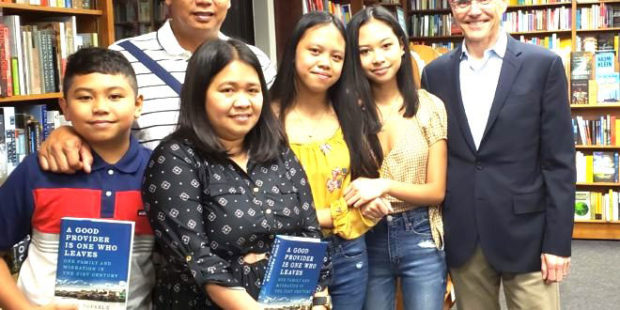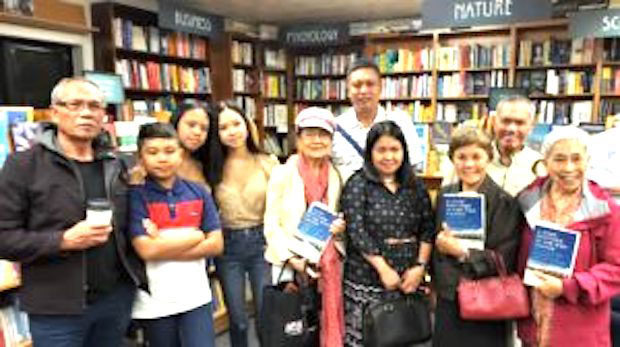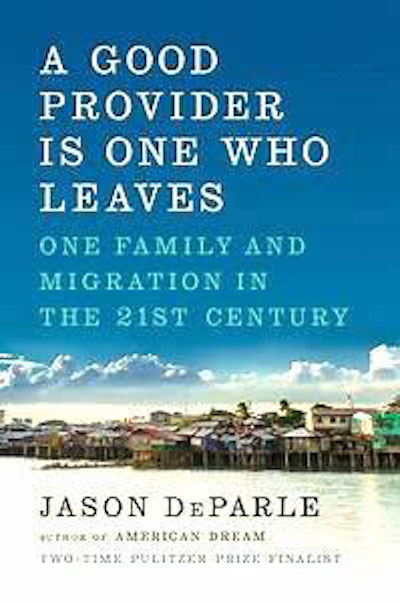‘A Good Provider Is the One Who Leaves’ — best argument for immigration

Author Jason DeParle (right) with the Villanueva family he wrote about, from left Dominic, Chris, Rosalie, Laura and Christine at Politics & Prose. JON MELEGRITO
WASHINGTON, DC — A Good Provider Is the One Who Leaves is the title of a new book by noted New York Times reported Jason DeParle. It is the story of a Filipino family, that is really like thousands of others, whose need to provide for their families causes them to find ways to leave the Philippines to seek gainful employment.
DeParle’s book was feted on NPR and the New York Times book review and is fast becoming the best argument for immigration, not just in the US, but worldwide. My first thought was – ho hum—another Filipino rags-to-riches story. Is there anything left to be said? Yes, we get it, Filipinos are poor and when they go abroad they do well, and that there is a high social cost to the families left behind—a cost measured in the social ills resulting from absentee parents and broken families.
When I found out that DeParle was presenting his book at the iconic Washington DC bookstore Politics and Prose on August 23, I defied the rain, rush hour traffic, and parking misery to show up because, maybe, just maybe, there was something new to be said. He did not disappoint.
The standing room crowd of over 200 literati were treated to an amazing tale of Rosalie Villanueva, an impoverished slum dweller, who rose from her dire circumstances to become a nurse, and eventually and painstakingly immigrate to Galveston, Texas, where she is now a respected member of the medical team of a large hospital. She is raising her three children to the standards of the American dream, that includes indoor plumbing, something she did not have growing up.
This type of survival story for Filipinos is not new and has been studied and much written about. What is different about DeParle’s book is that he followed a family, the Villanuevas, for three decades. The amount of detailed research and anecdotes has set a new standard in the literature of immigration, as one critic noted.
DeParle wove his narrative with a deft touch. He, as a New York Times reporter, of course could not resist jabs at the Trump administration’s restrictive immigration policy. He’s not a fan. Interestingly enough, I would guess that there were no Trump supporters in the audience because the Q and A’s and comments gathered from hobnobbing with the audience were totally supportive and sympathetic to the immigration narrative that Trump is against, a narrative that allows more immigration along the lines of the Villanueva story.

Fil-Am community leaders pose for a photo with the Villanueva family after the book launch and discussion held at Politics and Prose. Sonny Busa (second from right) a retired diplomat and history professor, lives in Annandale, VA. with his wife, Ceres. JON MELEGRITO
What made the evening more memorable was that Rosalie and her husband and three children were there to answer questions. Rosalie—shy and unassuming and utterly charming—was genuinely embarrassed by all the attention and couldn’t believe her story was such a big deal. It is a big deal because it is the only deal that many Filipinos have to improve their lot in life.
One observer noted that it was hard to imagine a better-timed book. It is the counter story to those opposed to immigration, not just to the U.S., but to everywhere else. Witness the immigration debate in Europe right now.
DeParle has written a masterpiece that ties the threads of immigration policy and its history with a warm account of one family. I hope it takes its place as the top book on the subject.
The book has this quote in the prologue. It requires no explanation: “Home has its charms, and native land has its charms, but hunger oppression and destination will dissolve these charms, and send men in search of new countries and new homes,” Frederick Douglass 1869.


